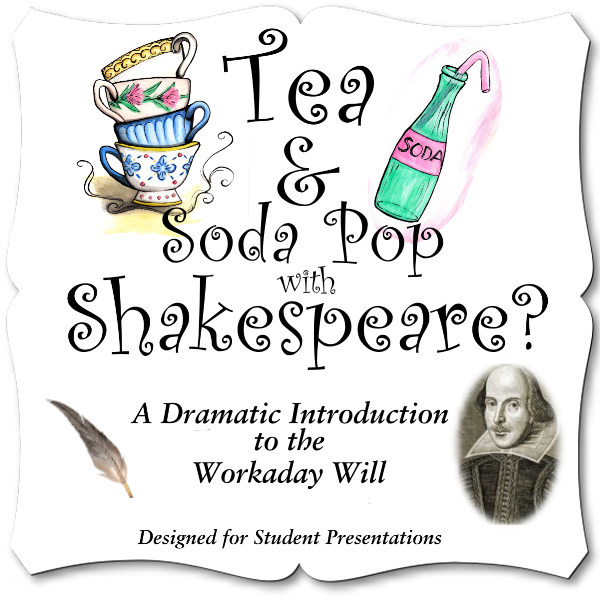 Tea & Soda Pop with Shakespeare?, A Dramatic Introduction to the Workaday Will, Designed for Student Presentations began as a series of three, youthful and entertaining, community-theater performances staged this past year of our Lord 2016, the year in which a goodly portion of the world honored the 400th anniversary of the Bard’s final exit, stage left.
Tea & Soda Pop with Shakespeare?, A Dramatic Introduction to the Workaday Will, Designed for Student Presentations began as a series of three, youthful and entertaining, community-theater performances staged this past year of our Lord 2016, the year in which a goodly portion of the world honored the 400th anniversary of the Bard’s final exit, stage left.
In spring 2016, I prepared three scripts, pulled two easy-to-sing songs [short samples below] from my musical comedy A Shakespearean Tale!, gathered a select group of enthusiastic young actors from our past productions, rented a couple of costumes, did a little local advertising, and voilà! (Or, “Bob’s your uncle!”) We had a lot of fun with Shakespeare. And even several “seasoned” adults told us they learned a few good things.
| Will Shakespeare is His Name | A Few Good Words for Mr. Shakespeare |
| [player id=809] | [player id=810] |
Unleash Your Students with Three Scripts and Two Songs and Have Fun!
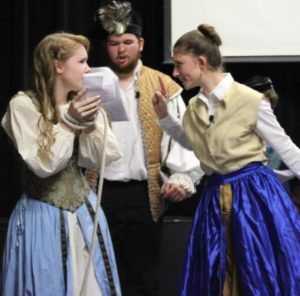
Fun with an excerpt of Taming of the Shrew!
My fall-of-2017 project is to publish the series as a book that will include the three scripts and two original songs (Will wrote a few himself, you know), designed for public, private, or homeschool classrooms or cooperatives, so you can easily do this with your own group, large or small, for both instruction and entertainment. Take it from someone who has written and directed 12 years’ worth of homeschool drama-class musicals and nine community-theater musical comedies for youth casts (ages 5 to early 20s) ~ kids love to perform! And it’s a wonderfully easy way to teach. [See song samples above — music will be available with and without singers]
In this photo, you can see three of our actors having great fun with a scene from Taming of the Shrew. Certain short portions were memorized, but most actors read from their scripts as they acted, radio style. That meant we only needed a few rehearsals and put the emphasis on fun.
Our cast played various roles, including Shakespeare, Ben Jonson, and members of London’s leading production company in which Shakespeare was an investor. We included roles for several of the known apprentices, the teenage boys who played “extras” as well as the important roles of the female characters ~ leading roles such as Kate, Juliet, Ophelia, and Rosalind. When the cast learned that the young fellow who played Rosalind in As You Like It had some 700 lines, their jaws dropped. When they learned that the acting company changed plays daily, their eyes glazed over. So did mine.
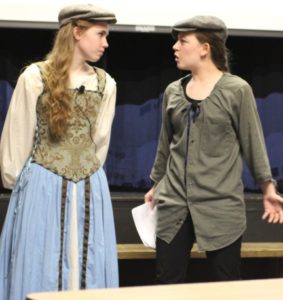
Merchant of Venice
The cast presented a few scenes from several plays, but mostly talked (as their character) about Shakespeare and his life as an actor and playwright, including why it’s “wright” and not “write.” They informed the audience of dodging the black plague and the city officials, about the monarch’s Master of Revels, and about the lowly social station of the “player” in the 16th and 17th Centuries, subject to vagabond laws and always in vital need of a noble sponsor. They spoke of the various theaters and the origin of the intermission. They described the audiences, from nobles to groundlings. And they explained that the Great Bard had little interest in publishing his plays. The First Folio of 1623, put together by two of Shakespeare’s loyal fellow actors, is the only reason we even possess most of Shakespeare’s plays. The core of the acting company worked (and often traveled) almost daily together for some 20 years and were friends as well as colleagues, named in one another’s wills.
For some historical context and perspective, we cast one young lady as a modern high-school student, having to study Shakespeare. Another cast member played Abigail Adams, who steeped her children (one a future president) in Shakespeare, keeping copies of his works in the nursery.
Tea with Will?
 Tea with Shakespeare certainly sounds appropriate, don’t you think? So very British, eh what? However, you wouldn’t have had tea with Will because tea didn’t even begin to get a leaf-hold in England until the mid-1660s and wasn’t really popular there until the mid-18th Century. Surprised? I was. And so were most of our cast and audience members.
Tea with Shakespeare certainly sounds appropriate, don’t you think? So very British, eh what? However, you wouldn’t have had tea with Will because tea didn’t even begin to get a leaf-hold in England until the mid-1660s and wasn’t really popular there until the mid-18th Century. Surprised? I was. And so were most of our cast and audience members.
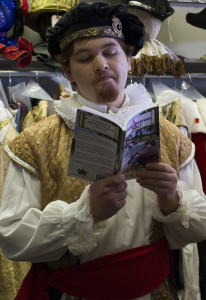
Is that Will himself?! Reading “A Shakespearean Tale”?
So, with Will ~ who left our stage in 1616 ~ it would most likely have been ale. Or gin. Certainly not water. (London water could be deadly.) Tea was not in the cupboard, or on the tavern menu, but would be popular in coffee houses by 1700. If that’s the case, why would I choose such a tea-sipping title for our presentations? And cast two of our very young actors as England’s Thomas Twinings and his wife? Because having tea with Will is an easy assumption to make if you are not equipped with the basic facts of history. (I wasn’t either, but I dug a little and learned a lot.) The “tea with Will” serves as a symbol of the myths that have grown like weeds across the centuries in the garden of all things Shakespearean. A part of my project was to lay before my cast and audiences the work of a few excellent scholars and help them do some myth busting, in a very family-friendly presentation.
A Family-Friendly Playwright Helps the Whole Family Discover the Great Bard
Why the soda pop? True, they are not the healthiest of drinks, but they communicate “young” and “informally friendly” in two words. As a family-friendly, youth-oriented playwright, I write to entertain a broad age range, and so my intentions with this project were the same. Tea skews older, soda pop skews younger, inviting my “whole-family” audience. If economy and power are two aspects of poetry, then our title is poetic! (As is our subject.)
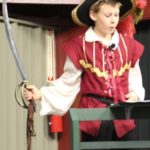
Our Ben Jonson
So, let’s cut right to the popular chase, shall we? Are you or your students wondering whether Shakespeare truly wrote Shakespeare? These dramatic presentations should intrigue and inform you all, and equip everyone to answer that question quite satisfactorily! Are you a fan of the Bard’s works on the page or the stage? Our discussion should please you. Have not a clue about Shakespeare and wonder what all the fuss is about? Keep an eye on this site for all the information regarding this upcoming publication, with PDFs of scripts and MP3s of songs. Everything is family friendly!

Happy Groundlings
The “whole family” approach is in the spirit of those times when “every schoolboy” (and later, also girl) dutifully memorized and recited many of the Great Bard’s most thought-provoking, insightful, beautiful, and powerful soliloquies and passages, featured in such sources as the McGuffey Readers. The English Bible and various works of Shakespeare, both found in some form in almost every cabin across the American frontier, were both freely taught in every schoolroom from the urban center to the prairie hamlet.
So, why not gather family, friends, and classmates and have a little fun and fellowship getting to know that amazing man from Stratford. And,… why not do our own duty to impart and reinforce some important aspects of our American history and heritage to our younger generations. They face a challenging incarnation of the “brave new world,” and they need to know that it was Shakespeare who gave them that oft-quoted description! AVAILABLE FIRST HALF OF 2021
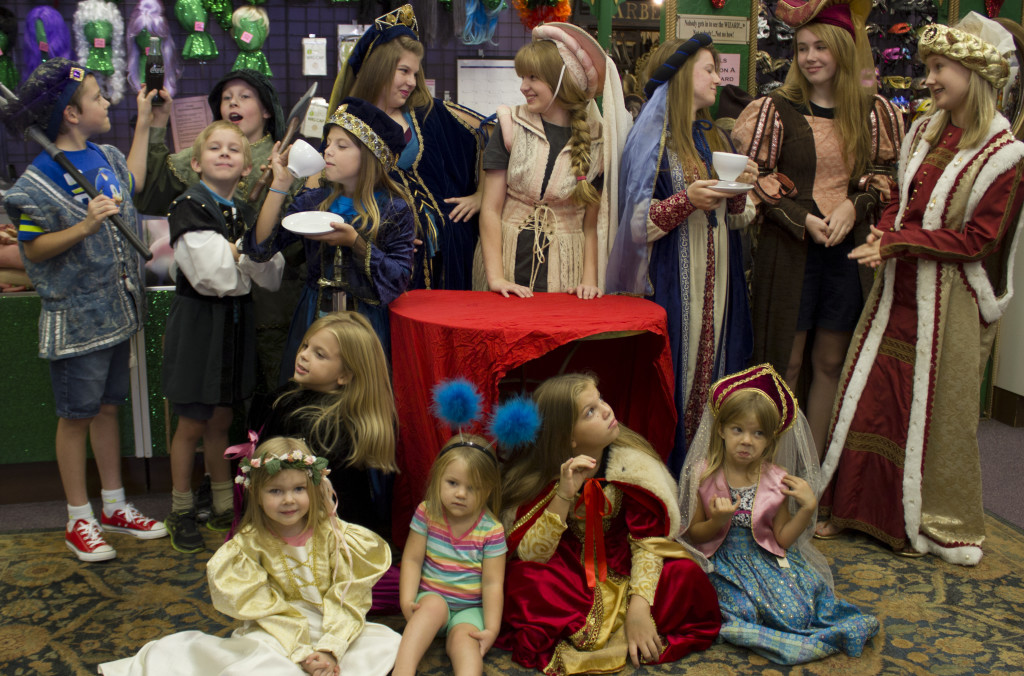
Tea, soda pop (look for it!), and kids having great fun at Rose Costumes
